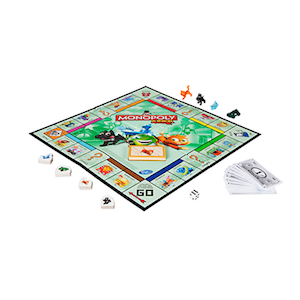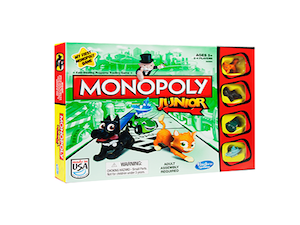Monopoly Junior: One of the Best Math Games for Kids
 I have never been able to finish a real game of Monopoly. I don’t have the attention span for the hours and hours it takes to finish. However, over the years I’ve used several different versions of Monopoly Junior with my students, which have been great for kids because they have much simpler rules and are faster to play. I personally think the latest version of Monopoly Junior is one of the best math games for kids.
I have never been able to finish a real game of Monopoly. I don’t have the attention span for the hours and hours it takes to finish. However, over the years I’ve used several different versions of Monopoly Junior with my students, which have been great for kids because they have much simpler rules and are faster to play. I personally think the latest version of Monopoly Junior is one of the best math games for kids.
Monopoly Junior is recommended for ages 5 and up, and though Gavin is only 4 1/2 he was interested in playing. We’ve probably played a dozen times together and with each attempt I’m amazed and frightened at how savvy my 4-year-old can be.
When kids learn to play games there are so many skills involved. The ability to be fair, social, communicate, and follow rules are just one part of the experience. Then add academic skills for number recognition, money management, and counting. To make it even more challenging go ahead and add a sibling into the mix who has different skills and needs. I tell parents every activity needs to have a “cost-benefit analysis.” We can not expect our children to follow all of these social and academic “rules” appropriately each and every time.
So gauge your child’s frustration tolerance, skill level, the time of day, timeframe you have to play, each and every time you play a game. Have a simple goal to help them learn to count or play fair, or recognize the dots on the dice and be flexible on the rest, it will all come together. However, you will lose out on these opportunities if the expectation bar is set to high and they won’t even entertain the thought of playing.
 Monopoly Junior is the same concept as the original adult version on a simpler scale. There are 4 characters (ship, boat, cat, dog) the kids move around the board, buying up properties like pizza parlors, skate parks, water parks, toy stores, and movie theaters for varying dollar amounts. Park Place and Boardwalk are still on the board and kids have an opportunity to still go to jail and receive $2 for passing Go. Chance cards provide them with an opportunity to earn free spaces, money, or pay relevant penalties. With this latest version, there are only $1 bills which I think makes the game play much easier for younger children. Basically the game is really about luck, roll the dice and buy the property you land on from the beginning. First player to lose all their money means game over.
Monopoly Junior is the same concept as the original adult version on a simpler scale. There are 4 characters (ship, boat, cat, dog) the kids move around the board, buying up properties like pizza parlors, skate parks, water parks, toy stores, and movie theaters for varying dollar amounts. Park Place and Boardwalk are still on the board and kids have an opportunity to still go to jail and receive $2 for passing Go. Chance cards provide them with an opportunity to earn free spaces, money, or pay relevant penalties. With this latest version, there are only $1 bills which I think makes the game play much easier for younger children. Basically the game is really about luck, roll the dice and buy the property you land on from the beginning. First player to lose all their money means game over.
The game is about luck, but Gavin has honestly beat me almost every time. This is the first dice game we’ve really played and within a few rounds he was already beginning to recognize what number corresponded to the dots on the side of the dice. I do have to help him count the spaces on the game board with larger numbers, but not all the time. He is able to recognize the numbers of how much properties cost and because there are only $1 bills to manage, he’s pretty good at giving me the appropriate dollar amounts. The pictures of the properties are well-drawn and self-explanatory and he can easily recognize them even though he can’t read.
So here’s where I’ve been amazed, some of these things may be seen as surface level “cheating” but there are skills he’s learning that will serve him well in the future like negotiation, sportsmanship, and project planning.
- Already Gavin has learned he doesn’t like to pay rent to me because he knows that he will have less money. Sometimes we “pause” the game play until he’s ready to pay up, which eventually he will. Not paying his “rent” isn’t an option I’m going to let him get away with, even at 4.
- He’s got plans and develops actions. He notices properties he likes and tries to find a way to get them. Sometimes he searches through the chance cards looking for a way to get it for free, other times I see him try and manipulate the dice to land there.
- We are learning about negotiation. Sometimes he wants to own a space I have. We will negotiate a price that we agree on, sometimes it’s double what the value is. Sometimes he takes the bait, sometimes he doesn’t.
- We practice shaking hands. In our family we end each and every game with a handshake to celebrate a “good game” no matter who wins or loses.
Disclosure: Hasbro provided a free sample of the game to facilitate this review. Any opinions are my own. No other compensation was provided.